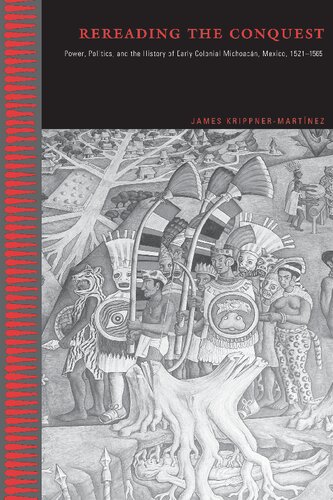

Most ebook files are in PDF format, so you can easily read them using various software such as Foxit Reader or directly on the Google Chrome browser.
Some ebook files are released by publishers in other formats such as .awz, .mobi, .epub, .fb2, etc. You may need to install specific software to read these formats on mobile/PC, such as Calibre.
Please read the tutorial at this link: https://ebookbell.com/faq
We offer FREE conversion to the popular formats you request; however, this may take some time. Therefore, right after payment, please email us, and we will try to provide the service as quickly as possible.
For some exceptional file formats or broken links (if any), please refrain from opening any disputes. Instead, email us first, and we will try to assist within a maximum of 6 hours.
EbookBell Team

4.8
84 reviewsCombining social history with literary criticism, James Krippner-Martínez shows how a historiographically sensitive rereading of contemporaneous documents concerning the sixteenth-century Spanish conquest and evangelization of Michoacán, and of later writings using them, can challenge traditional celebratory interpretations of missionary activity in early colonial Mexico.
The book offers a fresh look at religion, politics, and the writing of history by employing a poststructuralist method that engages the exclusions as well as the content of the historical record. The moments of doubt, contradiction, and ambiguity thereby uncovered lead to deconstructing a coherent conquest narrative that continues to resonate in our present age.
Part I, "The Politics of Conquest," deals with primary sources compiled from 1521 to 1565. Krippner-Martínez here examines the execution of Cazonci, the indigenous ruler of Michoacán, as recounted in the trial record produced by his executioners; explores the missionary-Indian encounter as revealed in the Relación de Michoacán; and assesses the writings of Michoacán's first bishop, the legendary Vasco de Quiroga, and their complex interplay of authoritarian paternalism and reformist hope. Part II, "Reflections," looks at how the memory of these historical figures is represented in later eras. A key text for this discussion is the Crónica de Michoachán, written in the late eighteenth century by the Franciscan intellectual Pablo de Beaumont.
Krippner-Martínez concludes with a critique of the debate that initiated his investigation—the controversy between Latin Americans and Europeans over the colonialist legacy, beginning with the Latin American Bishops Conference in 1992.